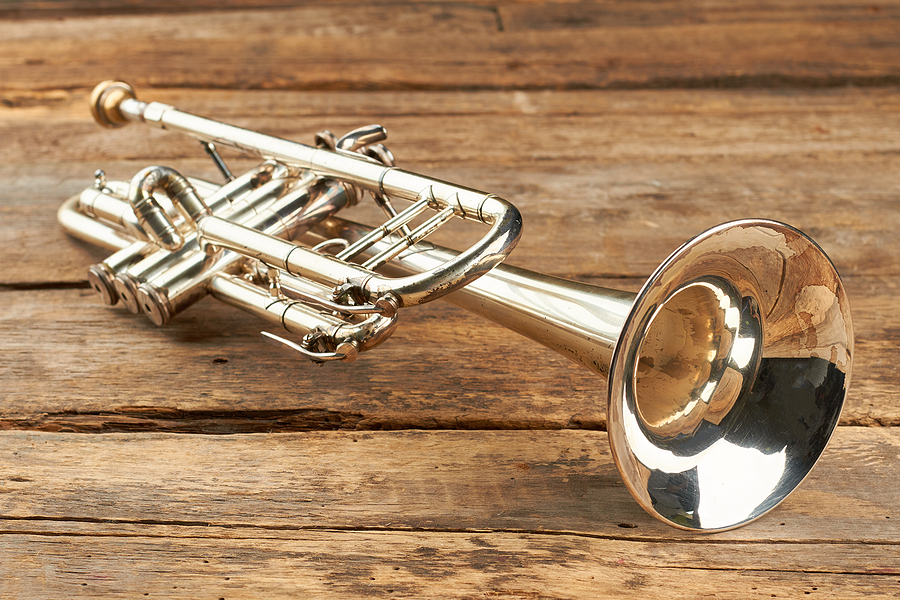Maintaining your trumpet is vital to keeping it looking and sounding its best for many years, but many trumpet players overlook this aspect of being a musician. You’ve probably heard that you should keep your trumpet clean, but advice varies widely on how often you need to clean it. Some say it should be cleaned every day, while others recommend once a week or even less frequently. Is it even possible to clean your trumpet too often?
A trumpet should be cleaned frequently to keep it in top condition and protect against bacteria growing inside the tubes. Empty the water valve as often as possible, at least after each time you play. Once a week, clean the lead pipe and wipe the outside of the trumpet. Perform a thorough cleaning, inside and out, once a month.
You can modify the suggested cleaning schedule so that it suits your routine; if you practice for hours per day, it makes sense that you would need to clean your trumpet more often than someone who plays just once or twice a week. Take these instructions as a general guideline for how regularly to clean your instrument and keep reading for some details on why keeping it clean is so important.
How Often Should You Clean Your Trumpet?
As previously mentioned, you should be cleaning your trumpet frequently and in-between playing times. In general, your instrument should undergo cleaning every week, month, and year, with each session dedicated to cleaning specific parts of the trumpet.
However, before you start cleaning, we recommend that you have the following supplies for the best results:
- Trumpet Maintenance Kit which includes:
- Valve oil
- Slide grease
- Valve casing brush
- Mouthpiece brush
- Flexible “snake” brush
- Polishing cloth
- Dish soap
- Sink or container large enough to fit your trumpet pieces
- Clean, soft rags
- Rubber gloves (optional)
- Polish (optional)
You can buy them each separately, but a trumpet maintenance kit is convenient since it contains most of the items necessary for at-home cleaning.
Weekly Cleaning
We recommend wiping the outside of your trumpet at least once a week (and ideally after every time you play) to remove water stains and fingerprints. This will keep your instrument looking great and prevent permanent staining that can damage your trumpet’s finish. Use the cleaning cloth that comes with your trumpet maintenance kit to clean the exterior surface of your instrument at least once a week.
Weekly cleaning of your lead pipe is also recommended. Keeping the lead pipe clean is the most critical maintenance task since that is where most debris is likely to get caught inside your trumpet. This is because it’s closest to the mouthpiece and is the longest pipe on the instrument.
By keeping the lead pipe clean, you won’t have to do a thorough cleaning of the other parts as frequently. Clean the lead pipe by giving it a quick brush with the snake brush from your maintenance kit. It should only take you a few minutes to do your weekly cleaning.
Monthly or Bi-Monthly Cleaning

A more thorough cleaning of all trumpet tubing should be scheduled monthly if you play your trumpet a lot or every 6 to 8 weeks if you don’t play as often. The monthly cleaning process involves taking the instrument apart and washing the pieces. It should only take about half an hour. If you have never cleaned the tubing of your trumpet before, consider watching this video for step-by-step instructions.
You will use the dish soap, warm water, and the brushes from your maintenance kit to clean the trumpet pieces. Don’t immerse the valves in water since the felt pads are not meant to get wet.
Some people like to soak the valves standing up in a drinking glass, with the felt above the waterline. Be sure to rinse all the soapy water off the trumpet pieces and let them dry thoroughly. Lubricate the valves and slides before reassembling it.
Once you’re finished cleaning and reassembling your trumpet, you can choose to polish it to remove tarnish and get a shiny finish. Remember to use the type of polish that’s made for the material of your trumpet, since you could damage the finish by using the wrong type. If you polish the mouthpiece, make sure to wash it thoroughly afterward, so you don’t get polish on your mouth.
Yearly Professional Service
Finally, we recommend taking your trumpet to a professional once a year for service and chemical cleaning. Professional maintenance can help you avoid the reddish corrosion called “red rot” or dezincification from attacking your trumpet. It’s also good practice to get a regular check from a professional who can diagnose issues that you haven’t noticed and fix those issues before they get more serious.
Is There Any Danger to Cleaning Your Trumpet Too Often?
In our experience, there is no downside to cleaning your trumpet frequently. The only caution is that the pistons and valve casings are delicate, so handing them could cause damage if you’re not sure how to do it correctly.
Use caution when disassembling your trumpet for cleaning, and never force parts to move. If any parts are stuck, take it to a repair person for assistance so you can avoid damaging the instrument.
What Could Happen if You Don’t Clean your Trumpet?
If you don’t clean your trumpet, you risk harm to both yourself and the instrument.
Not Cleaning Your Trumpet Can Cause Disease
Aside from being a bit gross, you might be surprised to learn that a dirty trumpet can be dangerous. If you don’t clean the insides of your instrument often enough, you’ll be inhaling the mold and bacteria that form inside the tubing. In some people, this can lead to a respiratory disease called hypersensitivity pneumonitis (HP) that has an increased incidence in musicians.
HP can cause difficulty breathing, a persistent cough, and fever. Over time, it can develop into fibrosis of the lungs, which is more dangerous. Most people were able to fully recover when they started to clean their instruments more regularly.
If you suspect you might have HP, we certainly recommend visiting a doctor. We’d also recommend avoiding humidity as much as possible in your practice and performance spaces and brushing your teeth before you play. Moisture and bacteria transferred from your mouth can contribute to the growth of disease-causing molds inside the trumpet tubes.
Not Cleaning Your Trumpet Can Damage It
Failing to clean your trumpet regularly is bad for you, and it’s also bad for your instrument. Oil from your hands or water that is not wiped off can cause stains and being exposed to air causes brass instruments to tarnish. That’s why regular exterior cleaning is essential.
Interior cleaning, as mentioned previously, helps to prevent bacteria and molds from developing inside the tubes. The environment inside brass instruments is the ideal place for these microbes to grow since there is moisture from condensation and food particles that you blow into the trumpet.
Professional interior cleaning using heavy acids is necessary to get rid of the elements that cause dezincification (red rot). Lime and scale can start to build up even with regular maintenance, especially in the areas where moisture collects, and they pull the zinc content out of the metal alloy.
If it’s not caught in time, dezincification can damage your tubes to the point that they need replacing. It’s better to invest in regular cleanings to maintain your investment than to end up needing a costly repair or replacement.
Conclusion
A well-maintained trumpet can easily outlast its owner and be enjoyed by multiple generations. Keeping your instrument clean and routinely serviced protects your health and prevents your horn from sustaining avoidable damage. With a bit of practice, the maintenance routine we have laid out will become a natural habit, and perhaps even something you look forward to doing.


